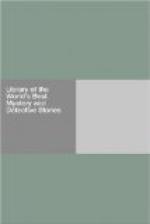Voltaire must have grinned at the delicious human interest, the subtle irony to pierce complacent humbugs, that lurked behind these Oriental situations. He made the most of his chance for a quaint parable, applicable to the courts, the church and science of Europe. As the story runs on, midst many and sudden adventures, the Babylonian reads causes from events in guileless fashion, enthusiastic as Sherlock Holmes, and no less efficient—and all the while, behind this innocent mask, Voltaire is insinuating a comparison between the practical results of Zadig’s common sense and the futile mental cobwebs spun by the alleged thought of the time.
Especially did “Zadig” caricature orthodox science, and the metaphysicians, whose solemn searches after final causes, after the reality behind the appearance of things, mostly wandered into hopeless tangles, and thus formed a great weapon of political oppression, by postponing the age of reason and independent thought. Zadig “did not employ himself in calculating how many inches of water flow in a second of time under the arches of a bridge, or whether there fell a cube line of rain in the month of the Mouse more than in the month of the Sheep. He never dreamed of making silk of cobwebs, or porcelain of broken bottles; but he chiefly studied the properties of plants and animals; and soon acquired a sagacity that made him discover a thousand differences where other men see nothing but uniformity.”
FRANCOIS MARIE AROUET DE VOLTAIRE
Zadig the Babylonian
THE BLIND OF ONE EYE
There lived at Babylon, in the reign of King Moabdar, a young man named Zadig, of a good natural disposition, strengthened and improved by education. Though rich and young, he had learned to moderate his passions; he had nothing stiff or affected in his behavior, he did not pretend to examine every action by the strict rules of reason, but was always ready to make proper allowances for the weakness of mankind.
It was matter of surprise that, notwithstanding his sprightly wit, he never exposed by his raillery those vague, incoherent, and noisy discourses, those rash censures, ignorant decisions, coarse jests, and all that empty jingle of words which at Babylon went by the name of conversation. He had learned, in the first book of Zoroaster, that self love is a football swelled with wind, from which, when pierced, the most terrible tempests issue forth.
Above all, Zadig never boasted of his conquests among the women, nor affected to entertain a contemptible opinion of the fair sex. He was generous, and was never afraid of obliging the ungrateful; remembering the grand precept of Zoroaster, “When thou eatest, give to the dogs, should they even bite thee.” He was as wise as it is possible for man to be, for he sought to live with the wise.




